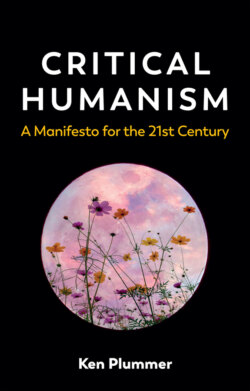Читать книгу Critical Humanism - Ken Plummer - Страница 30
Humanism abolished: the posthuman
ОглавлениеA final illustrative debate takes all this to an extreme conclusion. Looking disdainfully at humanism (as well as ‘humanitarianism’, ‘rights’ and even ‘transhumanism’), this debate aims to deconstruct these notions and come up with a real alternative. It suggests a posthuman, as opposed to a humancentric, worldview.58 This argument stretches back to the nineteenth century with Nietzsche and Spinoza. It moves forward in the context of two world wars and the Holocaust, with landmark debates between, first, Cassirer, Heidegger, Sartre, Barthes and Adorno, and, later, Foucault, Levinas and more: all, ironically, white European men. Ultimately, it pronounces on the ‘death of man’. It turns active human action and language into discourse performance and text; active human consciousness into a language of human subjectivity. It claims that too much damage has been done in the name of humanism: the very idea has been used to divide groups, and has brought suffering and cruelty to the world in its own name. It was most flagrantly revealed in the horrors of the Holocaust. Here, humanity was used by Nazis and fascists as a weapon to mark out the human from the nonhuman, the civilized from the barbarian, the grand colonizer from the pathetic colonized. Gradually (under the influence of largely male French theory), it morphs itself into the posthuman, against humanity and a sense of universal man. At its most flagrant, humanism is about man not woman. As a major proponent Rosi Braidotti says: ‘Universal “Man” … is implicitly assumed to be masculine, white, urbanized, speaking a standard language, heterosexually inscribed in a reproductive unit, and a full citizen in a recognised polity’ (I might add able-bodied, too). As she wryly asks: ‘How non-representative can you get?’59 More: it ignores animals and other forms of life. Here we have a humanism of elite and dominant groups working as a dangerous and exclusionary ideology.
In this argument, the central modern strategy of humanism is exposed as that of essentialism and racialization. It makes the nonhuman out to be a racialized being, the other. Exemplified in the appalling examples of indigenous peoples, slavery, the Jew and the Holocaust, it can also be found in the worldwide exploitation of lands and people through colonization. Here, large populations of the world have been subordinated (often slaughtered) by the invasion and rule of other (mostly European) countries. It was exemplified in the rise of scientific racism. And right now, often in the name of ‘humanitarian exceptionalism’, conflicts like those in Afghanistan have been waged, creating new dystopias.60 With seeming good reason, this is a growing argument that wants to abandon any kind of humancentric view of the world.
And it has a wide range of followers in a very broad range of activities. A work like Braidotti and Hlavajova’s Posthuman Glossary shows an extraordinary cacophony of new voices making new claims for the future, with an explosion of exciting new ideas from ‘Blue Humanities’ (Steve Mentz) and ‘Ecohorror’ (Christy Tidwell) to ‘Gaga Feminism’ (Jack Halberstam) and ‘Necropolitics’ (Christine Quinan). There is much of great interest in such detailed studies.61
That said, critical humanism cannot agree with any position whose ultimate conclusion is to announce the death of humanity and the human. I call this the fallacy of the end times. Once we announce the death of man, and the arrival of the posthuman, we are gone. There is little, maybe nothing, more to say about us. We have wished and written ourselves away. We are not here. End of Story. And these accounts ultimately do pronounce, even celebrate, this end of humanity.
Again, a critical humanist can agree with some of this posthuman analysis. But it argues that posthumanism throws away the baby with the bathwater. Despite its many earlier sins, maybe now we have reached a key time when we can learn to think of the wide interconnectedness of humanity with all life, all things – with the world and the cosmos.
